|
|
|
Sort Order |
|
|
|
Items / Page
|
|
|
|
|
|
|
| Srl | Item |
| 1 |
ID:
192005
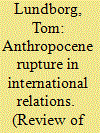

|
|
|
|
|
| Summary/Abstract |
The Anthropocene rupture refers to the beginning of our current geological epoch in which humans constitute a collective geological force that alters the trajectory of the Earth system. An increased engagement with this notion of a rupture has prompted a lively debate on the inherent anthropocentrism of International Relations (IR), and whether it is possible to transform it into something new that embraces diverse forms of existence, human as well as non-human. This article challenges that possibility. It shows how much of the current debate rests on the idea fulfilling future desirable ideals, which are pushed perpetually beyond a horizon of human thought, making them unreachable. As an alternative, the article turns to Jacques Derrida's understanding of the future to come (l'avenir), highlighting the significance of unpredictability and unexpected events. This understanding of the future shows how life within and of the international rests on encounters with the future as something radically other. On this basis, it is argued that responding to our current predicament should proceed not by seeking to fulfil future ideals but by encountering the future as incalculable and other, whose arrival represents an opportunity as much as a threat to established forms of international life.
|
|
|
|
|
|
|
|
|
|
|
|
|
|
|
|
| 2 |
ID:
091711
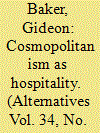

|
|
|
|
|
| Publication |
2009.
|
| Summary/Abstract |
For many cosmopolitans, an emergent global civil society is reframing the relationship between the universal and particular in world politics in ways that do justice to both. This article disputes this claim, finding that the concept of global civil society shares the same fundamental problem as state sovereignty, namely that it is better at articulating global identity than difference because it reproduces in different form statist attempts to describe a universal structure of particularity. It then argues that to avoid reducing difference to identity while remaining true to the cosmopolitan impulse to ethical universality, that is, to recognition of moral obligations to foreigners, it is necessary to take cosmopolitanism as synonymous with an ethics of hospitality enabling a nondialectical account of identity and difference in cosmopolitanism. As Derrida affirms, hospitality deconstructs the binary of identity and difference in our ethical relations with strangers. This dialectic-defying quality of cosmopolitanism-as-hospitality requires a greater decisionism than dialectical liberal-cosmopolitanism, turning cosmopolitanism away from the pure ethics of its liberal variants and transforming it into an ethicopolitics.
|
|
|
|
|
|
|
|
|
|
|
|
|
|
|
|
| 3 |
ID:
097795
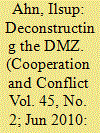

|
|
|
|
|
| Publication |
2010.
|
| Summary/Abstract |
The Demilitarized Zone (DMZ) has been a global symbol of perpetual conflict, hatred and distrust since its establishment in 1953 after the Korean War. The 155-mile ceasefire line has given birth to moral pathologies in the minds of Korean people that include 'otherness is evil', 'containment of war is peace' and 'restoration of the same is unification'. The purpose of this article is to reduce these moral pathologies through Jacques Derrida's deconstructive approach and Emmanuel Levinas's ethics of the Other. Through tripartite reduction of these moral ideologies of the DMZ, an ethical thesis is developed that peace is not a mere state of the absence of war, but rather a welcoming of radical others and differences. It is also argued that unification is not about restoring the same 'original we', but about co-reconstruction of the 'democratic we'.
|
|
|
|
|
|
|
|
|
|
|
|
|
|
|
|
| 4 |
ID:
073489
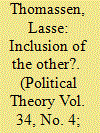

|
|
|
|
|
| Publication |
2006.
|
| Summary/Abstract |
In his most recent work, Jürgen Habermas has proposed a deliberative account of tolerance where the norms of tolerance-including the threshold of tolerance and the norms regulating the relationship between the tolerating and the tolerated parties-are the outcomes of deliberations among the citizens affected by the norms. He thinks that in this way, the threshold of tolerance can be rationalized and the relationship between tolerating and tolerated will rest on the symmetrical relations of public deliberations. In this essay, and inspired by Jacques Derrida's work on the concept of hospitality, I propose a deconstructive reading of Habermas's writings on tolerance. I argue that Habermas is ultimately unable to provide a rational foundation for tolerance and that his conception of tolerance encounters the same problems he is trying to avoid, namely, the contingency of the threshold of tolerance and a paternalistic relation between tolerating and tolerated. Yet, contra Habermas, the deconstruction of tolerance does not result in its destruction and does not force us to give up on the concept and practice of tolerance.
|
|
|
|
|
|
|
|
|
|
|
|
|
|
|
|
| 5 |
ID:
104025
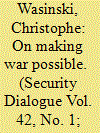

|
|
|
|
|
| Publication |
2011.
|
| Summary/Abstract |
The purpose of this article is to expose the existence of a recurring military grand narrative in the modern state-centric world. This narrative rests on techniques for codifying military discipline that appeared after the Middle Ages. It was then framed and diffused intertextually in classical military treatises thanks to the rediscovery of certain developments and concepts in the fields of geometry and perspective. According to the rules of this narrative, military actions are mostly described by mentioning the location and movements of (friendly or enemy) units deployed on a given terrain. This produced a geographical representation of war that is still largely relied upon by soldiers in contemporary armies (it will especially be found in current computerized systems available in contemporary military headquarters). The consequences of this narrative are manifold: (1) it participated in and assisted the reification and dehumanization of individuals as soldiers; (2) it acts as a rhetorical tool that rationalizes and naturalizes warfare; (3) and it strongly contributes to definitions of what war is in the modern state-centric world. In this way, it makes war possible.
|
|
|
|
|
|
|
|
|
|
|
|
|
|
|
|
| 6 |
ID:
134011
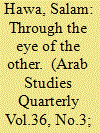

|
|
|
|
|
| Publication |
2014.
|
| Summary/Abstract |
This article seeks to apply Derrida's deconstruction of elements constituting national identity as established under colonial power to the study of Bassam Tibi, Fouad Ajami, and Bernard Lewis' work on Arab identity. This approach allows the emergence of colonial and neo-colonial elements underlying these authors' understanding of what Edward Said identified as the "Arab condition." Analyses show that both Arab authors' definition of Arab identity has been heavily influenced by colonial powers in a threefold manner: early colonization of the Arab lands by the Ottomans until 1920, European colonial rule during the nineteenth and twentieth centuries, and finally, the impact of living in the West. The article also highlights how the colonial power, exemplified in the work of Bernard Lewis, chooses to view the colonized "other" and often changes this view in accordance with political expediency.
|
|
|
|
|
|
|
|
|
|
|
|
|
|
|
|
| 7 |
ID:
122909
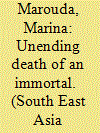

|
|
|
|
|
| Publication |
2013.
|
| Summary/Abstract |
Focusing on contemporary Viêt Nam, this article examines the monumentalizing project concerning the life, revolutionary career and political legacy of Hô Chí Minh. After Hô's death and especially after the introduction of doi moi, or renovation policies, the revolutionary state instigated a process of making memorials out of the places where he lived and struggled for the nation, projecting his biography onto the country's landscape. The article explores a series of ambiguities and uncertainties that, in a Derridian manner, haunt the state commemoration of Hô Chí Minh, and that are primarily manifested in his incomplete kinship status and imperfect death.
|
|
|
|
|
|
|
|
|
|
|
|
|
|
|
|
|
|
|
|
|